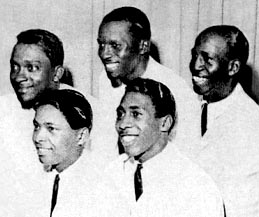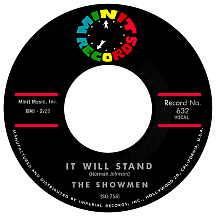THE SHOWMEN
It Will Stand
The rock and roll anthems of the 1950s confirmed the arrival of an exciting new music with a suggestion, or insistence, that the music world would never be the same. "Rock Around the Clock" by Bill Haley and his Comets, the first chart-topping rock hit, became an anthem by default. "Good Rockin' Tonight," a party song written and first recorded by Roy Brown in 1947, took on a new connotation after Elvis Presley remade it in '54. More obvious, tailor-made anthems followed, among them the celebratory "Rock and Roll Music" by Chuck Berry and "That is Rock and Roll" by The Coasters. Danny and the Juniors took a more protective stance with "Rock and Roll is Here to Stay," arguing against its many critics. Defending the music of their generation, they insisted '...it will never die' and predicted 'rock and roll will always be...it'll go down in history,' a bit of wishful thinking in view of all the older, authoritative opponents and the millions of parents who agreed with their point of view!
In 1961, after the dust had settled somewhat, an additional rock and roll anthem appeared that made its point, perhaps, better than the others. The Showmen's "It Will Stand," written by the group's lead singer Norman Johnson, reveled in the visceral joys of the music: 'Hear those sax blowin' sharp as lightnin'...hear those drums beat loud as thunder!' while pointing out that 'some folks don't understand it, that's why they don't demand it...,' then curiously taking a line from the Holy Bible's book of Luke: '...forgive them for they know not what they're doin',' attaching perhaps too much importance in making a subtle connection between art and religion.
Johnson and the group had been singing doo wop harmony together in their home town, Norfolk, Virginia, since the mid-'50s when they were barely in their teens and calling themselves The Humdingers. By 1960 their manager, Noah Biggs, had a demo recording made of the group, then consisting of lead singer Johnson, brothers Gene and Dorsey Knight (first and second tenors), baritone Leslie Felton and bass Milton Wells. East coast record companies had little or no interest, but Joe Banashak of Minit Records in New Orleans liked what he heard and arranged for the quintet to lay down some sides in the Big Easy with the label's hitmaking producer Allen Toussaint. Several tracks were recorded in the spring of 1961, of which "It Will Stand" and "Country Fool" were strongest. The anthemic A side broke big in New Orleans, Los Angeles, NYC and a few other major cities that fall but wasn't a slam dunk everywhere; over a three-month run from November '61 to February '62 it peaked in the middle of the national top 100 charts. Uptempo follow-up "The Wrong Girl" failed to catch on at all; three other singles were frustratingly cold-shouldered, including one that was likely ahead of its time: "You" set itself apart from earlier Showmen sides, a ballad with acoustic guitar and piano and unusual lyrics ('...with your 39-21-40 shape...yes you got me going ape-ity-ape...over you'). Oddly, the record was released with the title "39-21-46," suggesting an even more bombastic female figure than Johnson's object of obsession in the actual lyrics.

Liberty Records purchased the Minit label and its masters from Banashak in 1963, rereleasing "It Will Stand" the following year on Imperial (the distributing label for Minit that the L.A. company had similarly purchased from owner Lew Chudd). In May of '64 it hit big in the Detroit area (top ten at Windsor, Ontario's CKLW) and gained considerable airplay in different areas as it had the first time, propelling it back into the national charts for a few weeks that summer. The Showmen released "In Paradise" on the BB label in '65; Swan picked up the master but it and two other singles including "Our Love Will Grow" had little success outside the Carolina shore, where the group was being embraced as a "beach music" act. Minit took another shot with "39-21-46" and it caught fire along that same eastern seaboard, enough to give it a brief chart appearance in the summer of '67. Following a 1968 single on Amy ("Action"), General Johnson, as Norman was calling himself by that time, left the group and signed on as a songwriter and singer with Detroit's Hot Wax and Invictus labels, founded by Motown defectors Eddie Holland, Lamont Dozier and Brian Holland.
Johnson had his greatest success during his time with the new company. Putting together a new group, Chairmen of the Board, he composed and sang lead on several hits, most notably "Give Me Just a Little More Time," the group's debut on Invictus, a top ten hit and million seller in 1970. Other hits followed over the next couple of years: "(You've Got Me) Dangling on a String," "Everything's Tuesday," "Pay to the Piper" and a funky Holland-Dozier exercise in egotism, "Chairman of the Board." In addition, Johnson penned the Clarence Carter hit "Patches" (with Ronald Dunbar) and several hits for other Hot Wax/Invictus acts (in various collaborations with Greg Perry, Angelo Bond and Barney Perkins) including "Somebody's Been Sleeping" (a hit for 100 Proof Aged in Soul), "Bring the Boys Home" (by Freda Payne) and several hits for The Honey Cone (beginning with the '71 chart-topper "Want Ads").
Later in the decade Johnson recorded solo for Arista, then resumed fronting Chairmen of the Board. He also revived the Showmen in the 1980s and juggled separate, alternating tours for several years with each group. Though he had moved in a more soulful direction over the years, that initial impression so many people had about rock and roll persisted and "It Will Stand" came to be recognized as one of the genre's defining moments. After more than a half-century, any efforts to suppress rock and roll have proven unnecessary, the words of The Showmen, so far at least, containing the ring of truth: 'It'll be here forever and ever...ain't gonna fade...never, no, never...'


